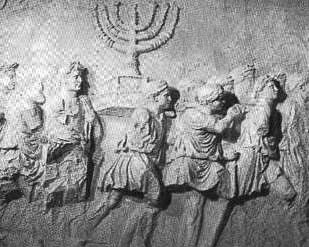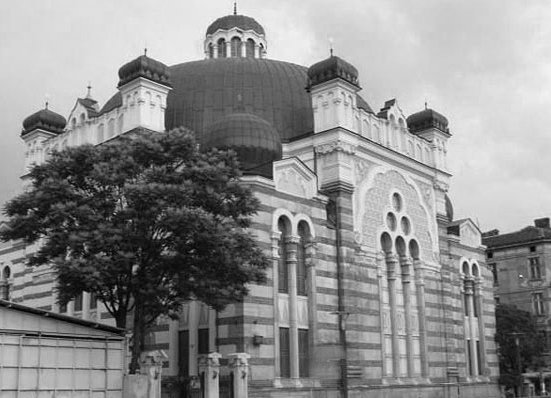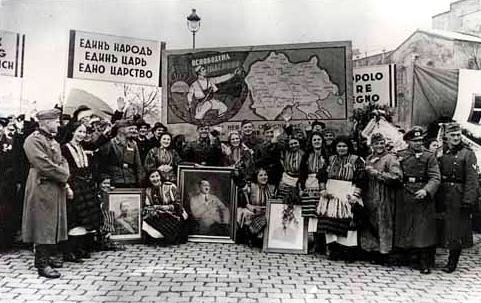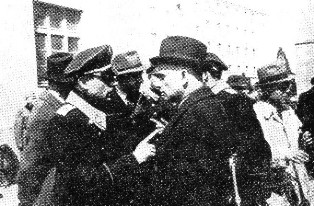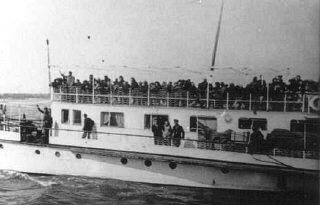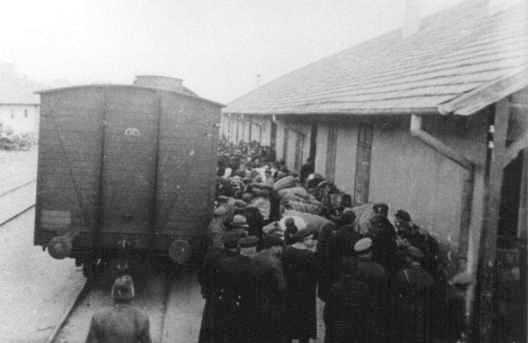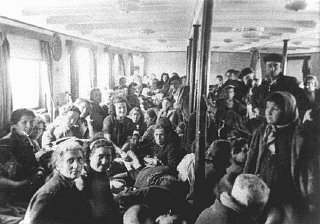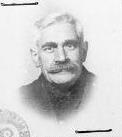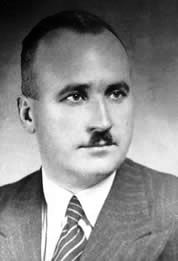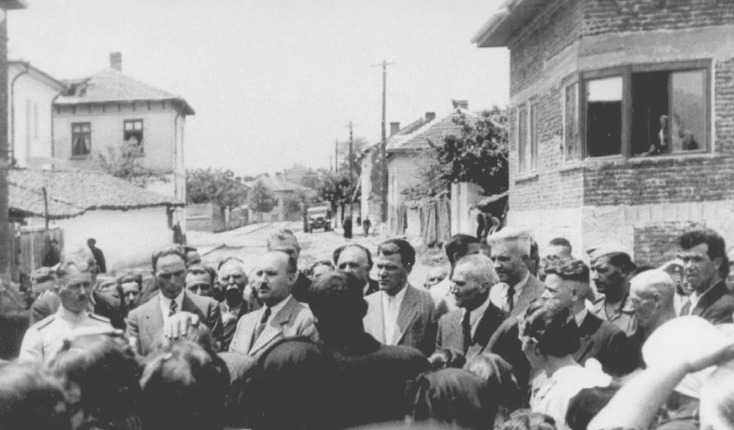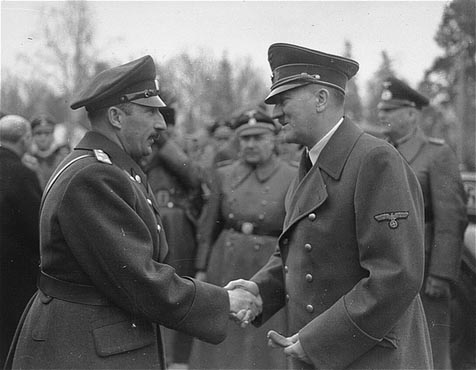Holocaust Education & Archive Research Team |
|
Occupation German Occupation of Europe Timeline
-
[The Occupied Nations]
Poland Austria Belgium Bulgaria Denmark France Germany Greece Hungary Italy Luxembourg The Netherlands Norway Romania Slovakia Soviet Union Sudetenland |
||||||
The fate of the Bulgarian Jews
The history of Jews in Bulgaria predates both that of the Bulgars and the Slavs in the region. Jews formed a vibrant community during the Middle Ages, and were respected by many of the ruling leaders of the day, one of the Tsars even married a Jewish woman who later became known as Queen Theodora.
These migrants came to be known as Sefarades, whose language came from Spanish and who now constitute 90 per cent of the Bulgarian Jews. Besides, the following centuries saw the migration to Bulgaria of Ashkenazi Jews, mainly from the German lands. Unlike the Sefarades, they were received with hostility, which eventually waned with time.
In the 17th century, the ideas of Sabbatai Zevi became popular in Bulgaria, with supporters of his movement like Nathan of Gaza and Samuel Primo being active in Sofia. Jews continued to settle in various parts of the country (such as the new trade centres like Pazardzhik), extending their economic activities due to the privileges they were given and the banishment of many Ragusan merchants after they took part in the Chiprovtsi Uprising of 1688.
By the 1930s, there was a slight increase in incidents of anti-Semitism, however there remained a generally high level of tolerance of all minorities, including the Jews. The peasants – the largest single element of the population – were by and large not anti-Semitic; Jews were more likely to be innkeepers than rent collectors.
Some anti-Semitism was brought back from Vienna and Berlin by returning students, but their impact was limited. There were also a few small fascist groups, but they did not find fertile soil even when they received German backing for their efforts; indeed, they tended to be closer to the Italian than to the German model, and again generally were not anti-Semitic.
In addition, there were publications and demonstrations against both fascism and anti-Semitism.
However, it should be noted that Communists remained members of Parliament since this was the period of the Nazi-Soviet Pact – and Jews still had full equality.
After Bulgaria officially joined the AXIS coalition in 1941, it's leaders were promised the territories of Thrace, and Macedonia. The Bulgarian King Boris was given full administrative control over these provinces and was hailed by his people as the "Unifier King"
Theodor Dannecker, Eichmann’s former representative for the Jewish Question in Paris, arrived in Sofia in January 1943, to fulfil the same role, to work with this department which was headed by Alexsander Belev, (a rabid Anti-Semite), who advocated all Jews be forcibly deported to the death camps in Poland.
He signed a secret agreement with Germany to deport over 20,000 Jews from Thrace and Macedonia. These Jews were sent to Treblinka and other camps. Less than a dozen survived.
Some 5,500 Jews lived in the parts of Greece annexed by Bulgaria; over 4,000 of them were arrested on 4 March 1943 and taken to Dupnitsa and Gorna- Dzhumaia internment camps. After ten days in the camps, on 18-19 March they were transferred by train to the port of Lom on the Danube.
Jews from the Yugoslav town of Pirot, which had also been annexed to Bulgaria, were also brought to Lom river port the Bulgarian authorities transferred the Jews who numbered 4,215 to the Germans.
On 20-22 March 1943 the Jews boarded four boats destined for Vienna, the trip took five to eight days, one of the boats sunk according to accounts. From Vienna, the Jews were sent by train to Treblinka on 26 and 28 March 1943, and they were all murdered in the gas chambers of Treblinka.
The parts of Yugoslav Macedonia transferred to Bulgaria after the German conquest contained a Jewish population of about 8,000, in the communities of Skopje, Bitola and Stip. From 11 March 1943 they were concentrated in an internment camp established at the tobacco warehouse called the Monopoly in Skopje.
Elena Leon Ishakh from Bitola testified about conditions in the camp:
“In one room there were over 500 of us. We arrived in Skopje around midnight and were locked up in the building of the Monopoly. The entire following day we and the Jews from Stip were kept under lock, because the search and plunder of the Jews from Skopje was still going on.
Having been locked up in the wagons the day before, and now the whole day in the building without latrines, people were compelled to relieve themselves in the corners and thus the air soon became unbearable.
Whenever one of us would peek through the window, a police officer would fire his pistol into the air. On 13 March they finally let us use the latrines. They let out the 500 of us who were in the room for half an hour then locked us up again, so that more than half the people were unable to relieve themselves or get water.
They let us out only once a day, section by section and then for such a short time that many of the weak, ill and invalids could not get down the stairs. Hunger pervaded, only on the fifth day did the camp authorities set up a kitchen, but for over 7,000 of us there were too many stoves.
Food was doled out starting at eleven in the morning, and the last ones were fed around five in the evening. Food was distributed once daily and consisted of 250 grams of bread and plain, watery beans or rice. They also gave us smoked meat, but it was so bad that despite our hunger we couldn’t eat it. Not even one-fifth of us had dishes, so that several people had to use the same dish.
Under the pretext of searching us to find hidden money, gold or foreign currency, they sadistically forced us to undress entirely… in some cases they even took away baby diapers. If anything was found on somebody, he was beaten.”
The Jews from Skopje camp were deported to Treblinka in three successive transports. The first transport with 2,338 Jews, left on 22 March 1943 and arrived in Treblinka on 29 March. In each of the freight cars there was a small barrel of water and several buckets into which people could relieve themselves. The luggage that people were permitted to take was 40 kilograms per adult and 20 per child.
The second transport with 2,402 Jews left on 25 March and arrived in Treblinka on 31 March 1943 in the evening, the third transport with 2,404 Jews left on 29 March reached Treblinka on the 5 April 1943.
The German officer who was in charge of the third transport described the journey:
Work Report -12 April 1943
Subject: Escorting the Jewish Transports
On the basis of a telephoned command from SS-Hauptsturmuhrer Danker the train left Skopje on March 23 1943, at 12:00, escorted by platoon No 1, which comprised thirty men and was commanded by Police Sergeant Buchner.
The train arrived at 23:00. On March 29, at 06:00, the loading of 2404 Jews onto freight cars commenced at the former tobacco sheds. Loading was completed at 12:00, and at 12:30 the train deported.
The train passed through Albanian territory. The final destination, Treblinka (the camp), was reached on April 5 1943, at 07:00, via Czestochowa, Piotrkow, Warsaw. The train was unloaded that same day between the hours 09:00 and 11;00.
Incidents:
Five Jews died on route. On the night of March 30 – an elderly woman of seventy, on the night of March 31 – an elderly man, aged eighty-five; on April 3 – an elderly woman, aged ninety-four and a six-month-old child. On April 4 an elderly woman aged ninety-nine died.
Transport Roster: received 2,404 Less 5
Total delivered At Treblinka 2,399
Signed: Karl
- Military Police Lieutenant and Company Commander.
Richard Glazar describes the arrival of a transport of Bulgarian Jews at Treblinka:
“People climb calmly out of the cars, without pushing, without crowding. It is easy to see they have come a long way. Apparently they have been in quarantine too. Their clothes are wrinkled and dirty, but they are good clothes, items of value.
Their faces look healthy and they have an unusual dark complexion. Black hair – all I see is black to pitch-black hair. On the left side, mostly on the left coat collar, each of them has a small yellow star.
This is the first time I have seen stars like this – I’ll have to wait until a few of them pass by. The star is very small, framed in black, without any lettering. And now I can see that they’ve been pinned on like broaches. Not made of fabric, but of some kind of material, maybe wood.
I can hear the people are speaking a completely foreign language."
Yankiel Wiernik described their fate in the death camp:
“Transports from Bulgaria began to arrive – they were eliminated like the others. The Bulgarian Jews were tall, strong and manly. When we looked at a man like that, we didn’t want to believe that only twenty minutes later he would end his life in the gas chamber. These fine looking Jews would hardly let the hangmen kill them so easily.
A small quantity of gas was introduced into the chambers, and the asphyxiation process went on all night. They suffered for a long time until they breathed their last. They also suffered terribly before entering the chambers. The hangmen were jealous of the victims’ fine appearance and maltreated them that much more.”
Word leaked out that this deportation was made without the consent of King Boris and the transport was halted by the heroic efforts of Dmitar Peshev. Peshev was a prominent politician in Bulgaria of the period before and during WW2, and in 1936 he served as Minister of Justice.
On the international scene, he favoured Bulgaria's alliance with Nazi Germany, in the hope that it would help the country recover the territories lost in the Balkan wars of 1912-1913.
Rushing into Parliament, he gathered a few members, and burst in the office of Gabrovski, the Bulgarian Minister of Interior, with a demand that the order be rescinded.
After a dramatic confrontation, Gabrovski ordered that the deportation be postponed. Peshev personally called the local prefect's office to make sure that the counter-order was being obeyed. Not satisfied with this, Peshev decided to publicly denounce this and further deportations from the podium of the Parliament, where he served as vice-chairman.
Drafting a letter of protest, he collected the signatures of over 40 members of parliament, addressed to the government and the king, in which he pleaded not to disgrace the name of Bulgaria by consenting to the deportation of its own citizen-Jews to Nazi concentration camps.
The public protest spurred by Peshev's posture caused the government to back down its plans to deport the country's 50,000 Jews. As a result of Peshev's actions thousands of Jews who were rounded up and herded into warehouse and schools awaiting the cattle trains bound for the death camps, were sent home.
Peshev, however, was penalized by his dismissal as vice-chairman of the parliament.
Belev and his Nazi overseers were furious by this action, and plotted new schemes to get rid of Bulgaria's Jews. Over 20,000 Jews were deported to the countryside as a first step to and inevitable "final solution".
Boris agreed, Jews were removed from the cities and relocated to various locations throughout the countryside, but not a single Jew was forced to leave Bulgaria. At the end of the war the Jews returned to their homes, which remained intact and waiting for them. In 1945, the Jewish population of Bulgaria was still about 50,000, its pre-war level. Next to the rescue of Danish Jews, Bulgarian Jewry's escape from deportation and extermination represents the most significant exception of any Jewish population in Nazi-occupied Europe. Beginning in 1948, however, more than 35,000 Bulgarian Jews chose to emigrate to the new state of Israel.
Sources:
The Final Solution by G. Reitlinger – Vallentine Mitchell &Co Ltd 1953. Rescuing Bulgaria's Jews: A 60th Anniversary Symposium Georgetown University – October 16, 2003 Holocaust Historical Society. Belzec, Sobibor and Treblinka by Yitzhak Arad – Indiana University Press Trap with a Green Fence by Richard Glazar – Northwestern University Press Bulgarian News Network The Jewish Museum of Deportation and Resistance Action Reinhard Camps -The genuine ARC website www.deathcamps.org OMDA Archives & Website
Copyright Carmelo Lisciotto, Chris Webb & Boris Skopijet H.E.A.R.T 2008
|
